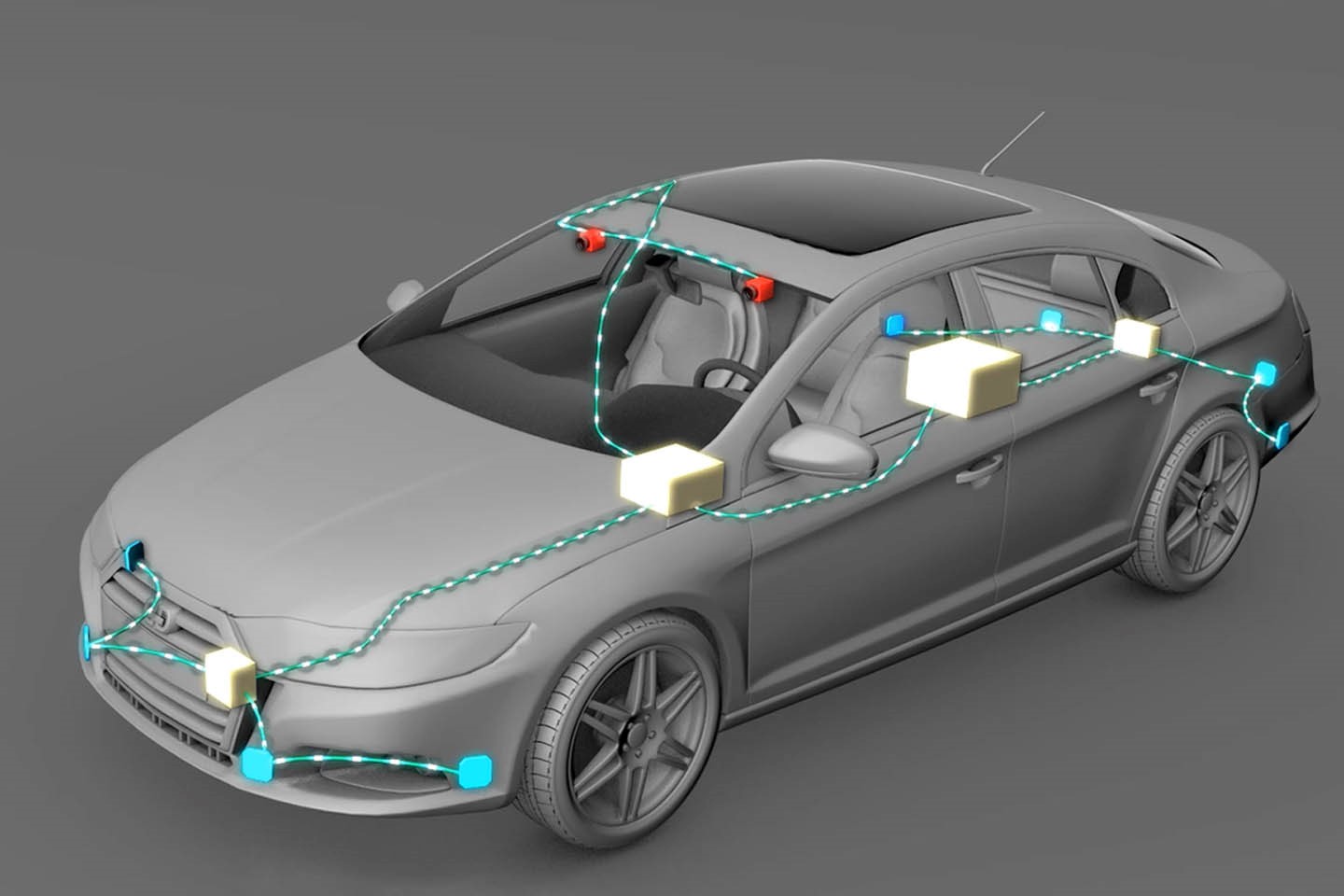
Fields of research
- On-board network and chip design for on-board electronics
- High-performance computing for autonomous driving
- Control units

Electronic systems in vehicles are becoming increasingly sophisticated, complex, and smaller. Vehicle electronics are the key component for controlling the flow of electrical energy in the vehicle. Among other things, it makes the electric motors turn, regulates the flow of energy from and into the battery, supplies the vehicle's electrical system, or enables wireless charging. The functionality and efficiency of cars, and in particular the safety of their occupants, have long depended on their electronics and the reliability of all materials, components, and systems, from semiconductors to system assemblies.
The importance of vehicle electronics will continue to increase due to the variety of digital functions. In particular, electromobility, which requires the corresponding semiconductors to control electrical power, or the computing power required for autonomously driving cars that communicate automatically with the parking garage, other vehicles or the cloud, are important drivers for their expansion. The architecture of the vehicle electronics must grow with it, as each new function requires a new control unit.
Researchers at Fraunhofer EMFT, together with several industry partners, have developed a clever alternative within the AutoKonf project: A redundant, generic control unit. If the control unit responsible for the steering or braking function fails, the redundant generic control unit takes over the respective task and can safely guide the vehicle.
Within the StroBA project, a Fraunhofer EMFT research team at the Oberpfaffenhofen site is taking a closer look at the effects of environmental impact on connector systems in cooperation with Ostwestfalen-Lippe University of Applied Sciences.
For more than 10 years, automotive audio has been an important part of product development at Fraunhofer IIS.
With Fraunhofer Symphoria, Fraunhofer Sonamic, JPEG XS (New Mezzanine Image Codec).
Learn more
Modern infotainment systems combine multimedia functions with safety-relevant traffic information and are also flexible for personalized applications. With DAB receiver kit, DRM receiver kit, hybrid radio.
Learn more
Multimodal Analysis for In-Cabin Sensing: more safety and comfort while driving.
The aim of MODELISAR is to create an innovative, open, complete solution for the modeling of vehicle-related systems, the generation of embedded software and an integrated simulation of vehicle systems and control software. MODELISAR was funded by the Federal Ministry of Education and Research (BMBF) as part of the ITEA (Information Technology for European Advancement) program.
Learn more
The German Federal Ministry of Education and Research supported the German research work. They were part of the European CATRENE project of the same name, in which companies and research institutions from the Netherlands and France were also involved.
Learn more
FLEUR was funded by the European Union and the Free State of Saxony as part of the European Regional Development Fund (ERDF).
Learn more
Fraunhofer IMS offers various competences and possibilities: ICs in license-free RISC-V processor architecture, functional safety functions and algorithms, and solutions for trustworthy electronics.
The spatial light modulators developed at Fraunhofer IPMS consist of arrays of micromirrors on semiconductor chips, whereby the number of mirrors varies depending on the application, from a few hundred to several millions.
This project has received funding from the European Union's Horizon 2020 research and innovation program under grant agreement no. 101014977.
The Fraunhofer IPMS offers various IP core designs for the automotive industry for in-vehicle-networking (E/E architecture).
In collaboration with industry partners, Fraunhofer researchers have developed a high-resolution illumination system with more than 1,000 LED pixels.
Funded by the Federal Ministry of Education and Research (BMBF)
Newly developed simulation models help to identify potential disruption paths and causes in advance and to take appropriate measures in a targeted manner. Fraunhofer IZM supports almost all German car manufacturers in this area and assists them with the introduction of their respective hybrids or electric vehicles.
In the car of the future, the industry faces the challenge of combining safety and maximum performance of the computer systems installed in the car. The CeCaS (CentralCarServer) research project aims to develop a corresponding supercomputing platform for highly automated vehicles.